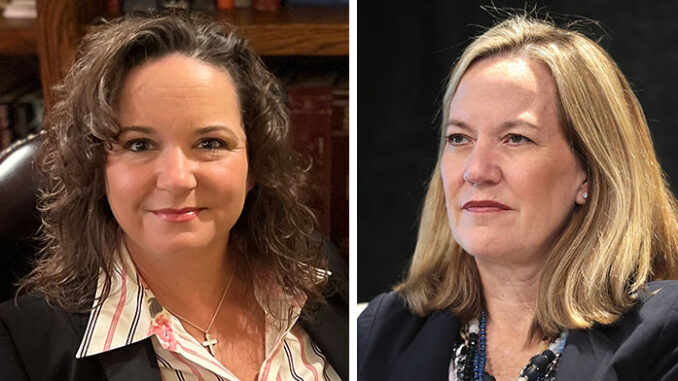
On Monday, Arizona Attorney General Kris Mayes was hit with a $2 million demand to settle a claim of defamation and unlawful release of employee information over comments published by the Arizona Republic that Mayes “removed” Jennifer Wright from her position with the attorney general’s office.
Wright headed the Election Integrity Unit under former Attorney General Mark Brnovich. She resigned her position effective Dec. 30, the day after a judge declared Mayes the winner of the attorney general race following a statewide recount.
Mayes was sworn into office on Jan. 2, the first business day of 2023. But Wright’s Notice of Claim dated July 3 focuses on a Jan. 5 article in the Arizona Republic that alleged Wright was “ousted” by Mayes as one of her first acts as attorney general. The notice of claim was addressed to Mayes “both personally and in your official capacity as Attorney General.”
Wright alleges “false and defamatory statements” regarding her departure from the Attorney General’s Office (AGO) were “knowingly planted into a major newspaper publication” with the “clear intent to damage my reputation.” The notice of claim also names the AGO as a public entity.
A notice of claim is required under Arizona law before anyone can initiate a lawsuit in state court against a public body, public official, or public employee. Wright had 180 days from when the article was published to submit her claim in order to preserve her right to sue Mayes and the AGO.
It is not only the comments to reporter Robert Anglen that Wright cites to support her demand for $2 million to settle her claims without further legal action. The notice of claim also outlines ways in which Mayes –or those acting on her behalf or at her bequest– allegedly violated the Arizona Administrative Code, which is a set of rules intended to protect state workers.
“Further, not only does Arizona administrative code prevent discussing even truthful statements about a state employee’s departure, but well-established case law makes it actionable in defamation to even accurately publicly disclose the terms of an employee’s departure in a way that is not only disparaging, but could harm that individual’s professional reputation,” the notice of claim states.
Mayes has 60 days to respond to Wright’s demand. If no response is received then the demand is considered denied and Wright is free to initiate a lawsuit no later than Jan. 5, 2024. Which is also her deadline to file a defamation lawsuit against the Arizona Republic and its involved staff.
Wright demanded a retraction and correction from reporter Anglen within hours of the Jan. 5 article. Anglen later responded to Wright that a “Mayes’ official twice confirmed that you had been ousted and you had been told to resign or be fired.”
In addition, Anglen emailed Wright that “the AG’s office stands by its statement that you were asked to leave, and the story will continue to reflect that.”
But just hours after the Arizona Republic article was published, Yvonne Wingett Sanchez of the Washington Post tweeted that she was told Wright “was gone when @krismayes team arrived.”
It took a week for the Republic to make what Wright describes as “a modest and incomplete correction to the false story.” By then, the damage to her professional reputation “had already been done” and continues to reverberate even after six months, the notice of claim asserts.
A defamation lawsuit against Mayes, the AGO, and the Arizona Republic could rest on who Anglen’s source was and whether a jury determines the media outlet unreasonably relied on that source, particularly after Wright challenged the accuracy of the article.
Wright’s notice of claim does not assume Mayes was Anglen’s source, nor that the recently sworn-in attorney general had advance knowledge of the source’s communication with the reporter. But as head of the AGO, Mayes is responsible for the actions of those acting on her behalf.
A jury would also likely want to know what role the attorney general played once Wright was able to prove she resigned on her own before Mayes was sworn in without any communication pressuring her to do so.
But regardless of who did what, Wright contends the situation was completely unnecessary and preventable.
“At all times, you and your office knew or should have known that the statements that I was fired or that an ultimatum was given were false,” the notice of claim states.
